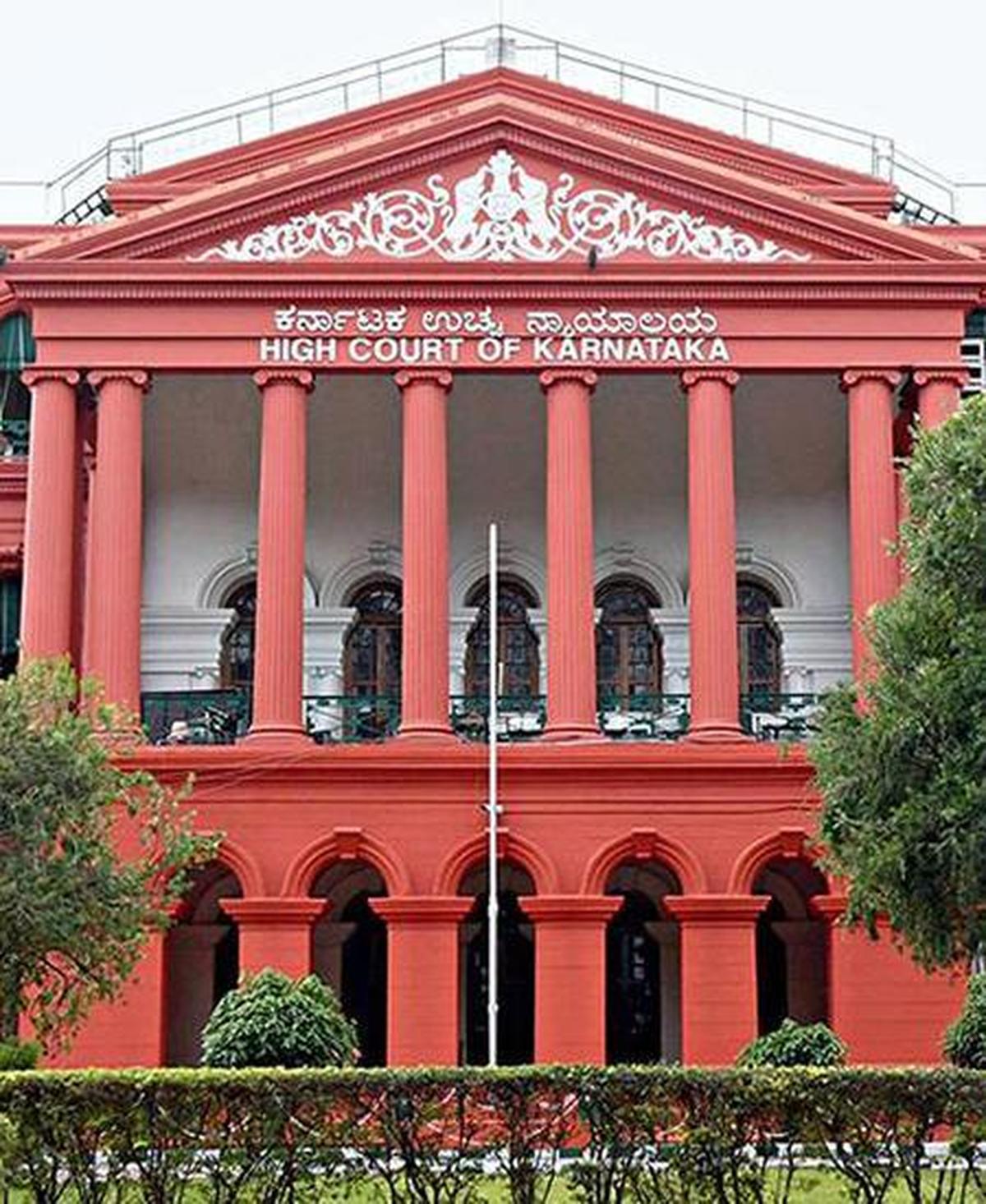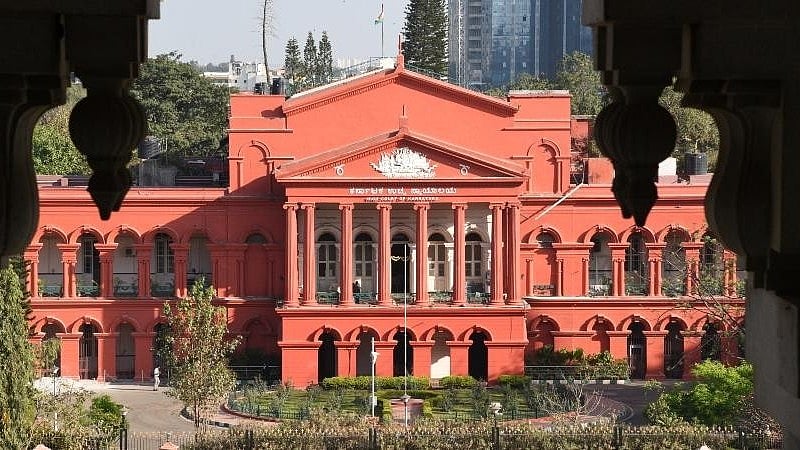The Karnataka High Court has stayed the suspension of an Assistant Executive Engineer (AEE) of the Ballari City Corporation, who was penalised after removing illegal flex and banners allegedly linked to the husband of a local councillor. The court’s interim order has generated intense public debate, with many framing the issue as a fight between individual officers seeking to enforce civic rules and the political pressures that obstruct their responsibilities. The incident has now escalated into a larger discussion on whether municipal employees can carry out their duties independently when actions affect influential political families.
The case began when the AEE initiated the removal of unpermitted banners installed in public spaces in Ballari. These advertisements reportedly promoted events associated with the husband of a councillor representing the Ballari City Corporation. The officer cited municipal regulations and local governance laws that forbid unauthorised banners, posters and hoardings in public areas. Soon after the removal drive, complaints were allegedly lodged against the AEE, accusing him of misconduct, leading to his suspension. Civic activists argue that the punishment signalled a message that laws can be selectively applied depending on who is affected.
Judiciary Questions Administrative Fairness and Political Targeting
In its decision, the Karnataka High Court observed that the suspension appeared to be hasty and lacked sufficient justification. The court questioned whether disciplinary proceedings were initiated merely because the officer acted against individuals with political influence. Legal experts note that the court’s scrutiny aligns with established jurisprudence asserting that suspension cannot be used as a punitive measure without evidence of wrongdoing. The court emphasised that officers should not be penalised for performing duties mandated by law, especially when the action concerns the protection of public property and civic order.

During the hearing, the court reportedly asked whether there was any enquiry establishing misconduct before placing the officer under suspension. It also sought clarity on whether the banners in question were indeed illegal. Preliminary reports submitted by municipal authorities confirmed that the banners had not received mandatory permissions. The High Court found that this fact strengthened the argument that the AEE was performing his lawful duty. Legal observers say the situation could have implications for how municipal administrations respond to future complaints that arise from politically sensitive enforcement actions.
The court also highlighted that suspension may only be justified when a continued presence of an officer in service could influence the investigation or hinder public interest. In this case, the government failed to demonstrate any such reason. Instead, the court noted that the removal of illegal banners was a necessary civic function, and the officer’s actions should have been supported rather than penalised. Commentators view the interim stay of suspension as a signal that the judiciary remains vigilant about administrative decisions driven by political pressures rather than objective criteria.
Municipal law experts argue that banner regulations are often misused by politicians who seek informal control over public display spaces. Unauthorised banners frequently violate advertising rules, obstruct traffic, and alter public landscapes without accountability. When enforcement officials attempt to remove them, they can face retaliation from elected representatives who believe civic controls should bend to political influence. The High Court’s order, they say, may deter such unwarranted interference and embolden officers to act in accordance with legal duties without fear of punitive reprisal from local politicians.
Debate Sparks Between Civic Duty and Political Influence
The Ballari incident has also ignited a public discussion about decentralised urban governance and how closely it is linked with electoral influence. Local civic activists argue that councillors often treat public property as an extension of their personal political branding. Events conducted for social causes, festivals or public celebrations are frequently used as platforms for political visibility, and illegal flex banners become informal advertisement channels. In several cities, these banners appear on electric poles, drains, bus shelters and heritage structures, often causing visual pollution and obstructing maintenance activities.
Environmental groups have also reacted to the case. They note that illegal banners made of plastic and vinyl contribute to waste generation and are often dumped on roadsides when removed. Despite statewide initiatives against single-use plastics, enforcement remains weak when the offenders are politically connected. Civic engineers and municipal workers say they regularly encounter threats during removal campaigns. Some officers, they claim, prefer to ignore violations to avoid political backlash. Many believe that the High Court’s stay order may encourage stronger implementation of banner-removal rules, promoting a cleaner urban environment.
Social media responses have been divided, but a large portion of the public has expressed support for the AEE. Users have praised the officer for standing by rules despite possible consequences, seeing the suspension as symbolic of systemic misuse of authority. Some have called for legislation that would protect civic officers from political intimidation. Others caution that public outrage should not overshadow due process and insist that each case must be judged objectively based on evidence. However, the general sentiment reflects growing frustration over the politicisation of municipal services.
Veteran administrators have weighed in, recalling similar episodes in Karnataka and other states where officers faced transfers or disciplinary action after enforcing laws against political banners or encroachments. They maintain that urban governance often suffers because officials hesitate to act when enforcement affects local leaders. An officer’s career progression, they argue, is shaped not only by performance but by how well they navigate political sensitivities. Some retired administrators have urged lawmakers to develop a framework that shields civic workers from punitive action when they implement court orders or laws approved by elected bodies.
Legal analysts suggest that this case could lead to more litigation on the protection of honest public servants. Discussions are underway among civil service associations about approaching courts to reinforce guidelines preventing suspension without adequate grounds. They argue that disciplinary measures must not discourage lawful enforcement. Advocates emphasise that temporary stays must eventually be followed by structural reforms. Without long-term solutions, they warn, individual victories in court cannot resolve the deep-rooted imbalance between civic power and political pressure that affects municipal governance across India.
Public policy researchers note that while courts can intervene, the primary responsibility lies with governments to frame fair administrative protocols. They stress that political establishments must recognise that strengthening civic enforcement is not a threat to elected representatives but a necessary component of functional urban governance. A robust framework that discourages illegal banners, encroachments and visual clutter can improve public safety, ease traffic management and elevate the visual identity of cities. Bengaluru, Mysuru and Hubballi-Dharwad are among Karnataka’s cities where similar challenges persist with limited success.

Cultural commentators have also reflected on a broader sentiment that public spaces are gradually being overtaken by private interests, sometimes under the guise of community events. They question whether political visibility should depend on occupying streets, walls and poles rather than transparent communication through regulated channels. The criticism highlights the emotional attachment ordinary citizens have to shared public spaces, which serve as symbolic assets of community identity. The push to protect them from misuse, therefore, is not merely an administrative concern but a cultural aspiration rooted in civic dignity and collective ownership.
The High Court’s decision in the Ballari case has temporarily restored the officer’s reputation and position. However, many believe that the larger battle lies ahead. The outcome of further hearings will determine whether disciplinary inquiries will be dropped or pursued with greater transparency. For now, the stay order reinforces that the judiciary remains an important safeguard for municipal officials attempting to uphold public laws. Supporters of the AEE hope that the case sets a precedent encouraging officers across Karnataka to perform their duties without fear, and that elected representatives will respect legally mandated urban regulations.
In the weeks to come, civic activists, legal experts and government officials are expected to follow the case closely. Pressure may build on city corporations to ensure that enforcement drives are backed by written orders and transparent approvals to shield officers from retaliation. The debate may also prompt bureaucratic associations to advocate stronger protection mechanisms. Ultimately, the case has drawn attention to a fundamental question: Can urban governance thrive when enforcement is vulnerable to political influence? The High Court’s intervention offers hope, but its long-term impact will depend on whether institutions respond with structural reforms.
Conclusion: Hope for Fair Governance and Respect for Civic Law
The suspension stay granted by the Karnataka High Court represents more than an individual officer’s relief. It symbolises a collective aspiration for governance that respects lawful enforcement over political convenience. As the legal process continues, many hope this episode will mark a shift in how municipal duties are perceived and protected. Advocates of good governance argue that civic officers must be empowered to implement legal mandates without fear of reprisal. If reinforced through policymaking, the Ballari case could emerge as a milestone in protecting the integrity of urban administration across Karnataka.
The suspension stay granted by the Karnataka High Court represents more than an individual officer’s relief. It symbolises a collective aspiration for governance that respects lawful enforcement over political convenience. As the legal process continues, many hope this episode will mark a shift in how municipal duties are perceived and protected. Advocates of good governance argue that civic officers must be empowered to implement legal mandates without fear of reprisal. If reinforced through policymaking, the Ballari case could emerge as a milestone in protecting the integrity of urban administration across Karnataka.
Follow: Karnataka Government
Also read: Home | Channel 6 Network – Latest News, Breaking Updates: Politics, Business, Tech & More

